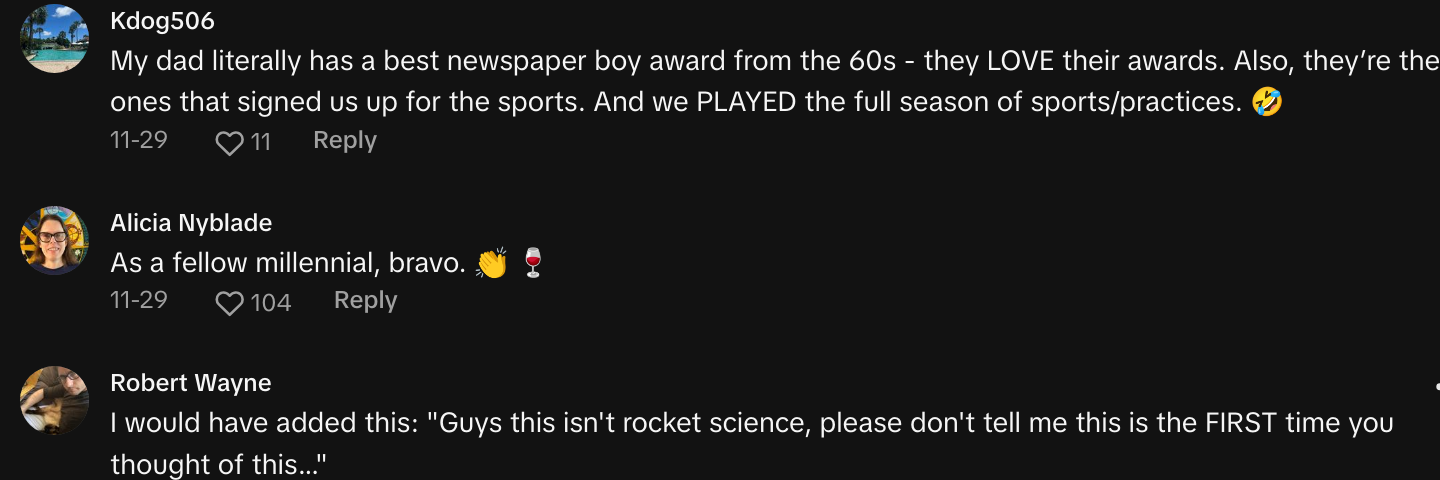“You Made Them” — Woman Pokes Hole in Boomer Family’s Participation Trophy Argument
"You gently parented your elders."
Published Dec. 18 2024, 12:43 p.m. ET
There are many things that irk Boomers about the younger generations: lack of work ethic, phones and social media, and perhaps one of the most infamous of all: participation trophies.
TikToker Jacqueline (@jac.rose8) commented on this subject in a recent TikTok. From her garage, she monologues in a video that's accrued over 90,000 views.
She says in the video: "I’m sitting in the garage post-Thanksgiving ... so it’s me and six Boomers, my parents being two of them ... And they started to talk about participation trophies. I heard them say, ‘Yeah, they’re all whiny and couldn’t handle competition, so they needed participation trophies.’ And I turned around and go, ‘But you gave us the participation trophies. We didn’t give them to ourselves.'"
She continues, "It’s the parents' job to teach the lesson about winning and losing ... You didn’t want to do that, so you came up with participation trophies to shut us up.”
Jacqueline’s hot take on accountability left the room in silence. She shared, “My mom goes, ‘You know, I have to agree with her.’ And then her friends agreed too. My dad tried to change the subject, but my mom wouldn’t let him off the hook."
It's easy to see where Jacqueline's coming from with this approach. What are kids supposed to do? Say "no" to the participation trophy? Because they're children, they're more likely to follow the lead of adults.
Other fresh takes were featured in the comments section of Jacqueline's post. One person wrote: "I also don't remember a single kid asking for trophies they didn't win or crying about losing. It was the parents who had big emotions about their kids losing."
Another didn't want to be lumped in, "I legit hated participation trophies as a millennial. I’m too competitive for it. It was basically the same as losing to me. Also why I never kept horse show ribbons that weren’t first or second."

Another was proud of Jacqueline, "You have the only successful cross-generational holiday story I've heard this year! Well done!" A final commenter reiterated the point, "Yup everyone wants to blame the millennials for participation trophies but we aren’t the ones who made them."
How far back do participation trophies date back? As it turns out, pretty far. The concept of these awards given to all participants regardless of outcome — has been a topic of debate for decades now. One of the earliest mentions dates back to 1922, when The Evening Independent reported on a high school basketball tournament in Massillon, Ohio, where these trophies were distributed.
This get-one-even-if-you-didn’t-win practice became even more popular in the latter half of the 20th century, especially as mass production of trophies became more common in the 1960s.

Now, in 2024, it seems that this practice is wholly intact. Proponents of participation trophies contend that they boost self-esteem. Furthermore, they encourage increased levels of participation in athletic events, hopefully to teach kids to strive and try to get better.
Critics, however says these just-for-showing-up trophies don’t promote excellence. That's because not allowing children to fail will more often than not hinder them from learning important life lessons: resilience, coming back, and being tough. To quote Rocky Balboa, "It’s not about how you fall, it’s about how you get back up."
Finding a balance between encouraging effort and rewarding winning isn’t easy. Many experts say it’s fine to acknowledge participation when kids are young, but as they get older, phasing out participation awards in favor of performance-based ones can help them grasp what it means to actually be successful, rather than receiving a facsimile of actual accomplishment.

But many argue that there's a way to extrapolate use out of participation trophies, as long as it's up to a certain age. For children 8 and under, these awards make sense. For some kids, simply showing up and dedicating time to an endeavor can be considered an accomplishment.
Between 8-12, kids may start wanting to win and actually test their knowledge in application through the rigors of competition. Past 12, excellence should be rewarded as it most closely aligns with human nature.
“Back in my day, if you sucked, you sucked,” is something you might hear a Boomer say. But, like Jacqueline stated, it is Boomers who decided to start handing out these trophies in the first place.
Maybe they should have, instead, not allowed the stresses of their own upbringing transform into a desire to try and make things easier for their own children so they wouldn't have to endure the same hardships. Now, it appears, their ire towards participation trophies is a matter of projection. It could be that the anger they display towards these empty accolades are a reflection of their own failures.
And, rather than taking accountability, they blame youngsters for taking the bait they dangled in front of their faces.
